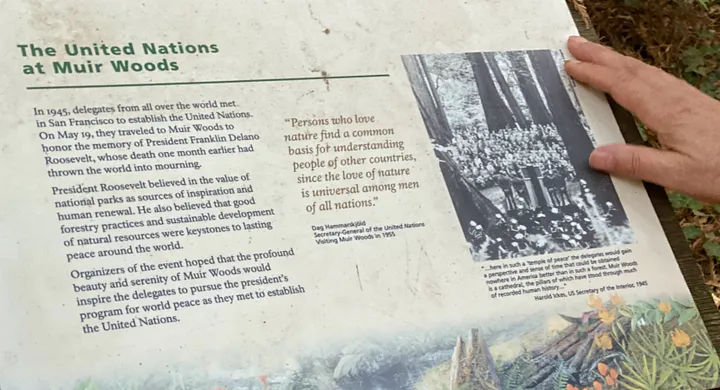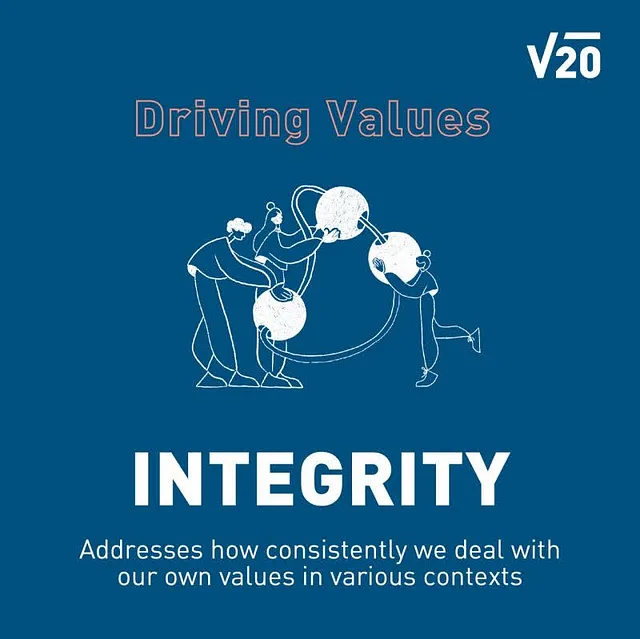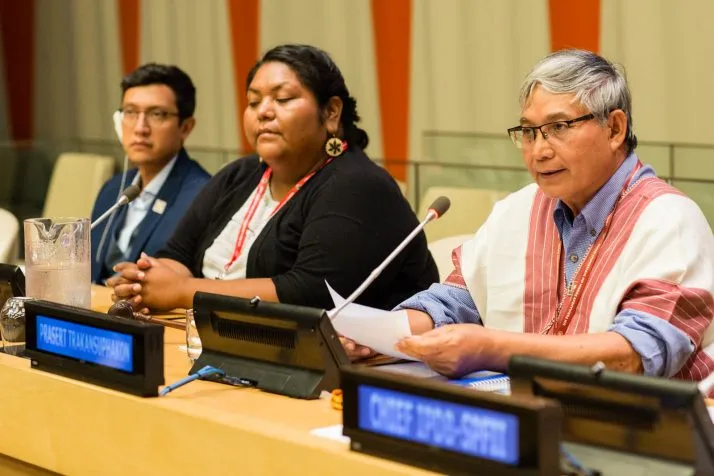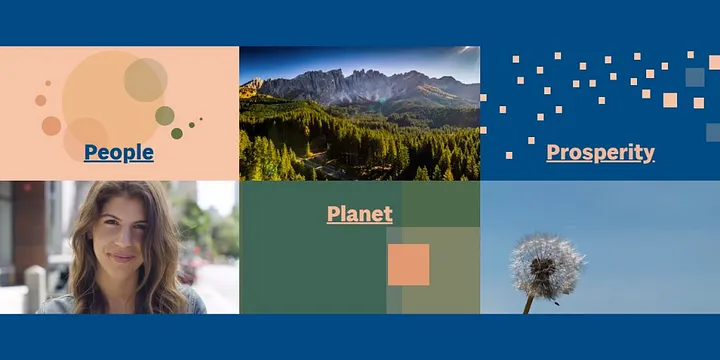Preventing The Collapse of Multilateralism:
Towards a Values-Based Planetary Governance
Dr. Alfredo Sfeir-Younis, President and Founder, The Zambuling Institute for Human Transformation, Chile and Dr. Marco Tavanti, Professor at University of San Francisco’s School of Management, USA.


Dr. Alfredo Sfeir-Younis visiting the site at Muir Woods National Monuments where the international delegates visited on May 19, 1945 during the The United Nations Conference on International Organization (UNCIO) that constituted the United Nations Charter in San Francisco (April 25-June 26, 1945). Photo by Dr. Marco Tavanti in the Cathedral Grove of Muir Woods, a nature sanctuary of millennial redwood sequoias.
Multilateralism at the Crossroads
Today’s multilateralism is at a crossroads. It needs to be brought and oriented to the real nature and character of the 21st century: the power of citizenry, the planetary human collective, and the rights-based society. As we experience a rise in human consciousness, we begin to embrace a new set of collective values and to advocate for more creative conditions and solutions for a planetary-rights-based-society to emerge. Most citizens are called to take the responsibilities embedded in challenges that no individual country, or community, can resolve by itself (e.g., health pandemics, climate change, biodiversity depletion, peace and security, migration, and denuclearization).
The Era of Citizenry
In “The Era of Citizenry”, the systemic participation in decision-making by civil society, nurtured by a countless number of relevant actors (e.g., NGOs, corporate sector, communities), makes it evident that a ‘State-Centered-Only-Multilateralism (SCOM)’ is no longer the strategic path to be followed. Today, we witness (i) the increased self-empowerment of global citizens (e.g., the climate change movement) and (ii) the progressive adoption of a planetary approach to human daily challenges (e.g., Covid-19). As the notion of a “nation state” was singularly relevant to the “Treaty of Westphalia” (1648), today, the call is for a planetary approach to our human future, going far beyond the identity and power base of nation states only. Also, the urgent necessity to properly manage our global-public-goods (e.g., climate, biodiversity, oceans, glaciers, genetic heritage, security, peace) heightens the necessity to shift the transformational power of an inevitable transition from a market-oriented-society to a right-based-global-system (e.g., right to a clean environment, right to food and nutrition, right to health and education).
The future of multilateralism rests on both: country leadership and a major coalition of interest with civil society organizations, strengthened by planetary citizenry. The foundations of such a coalition must be co-created by all the relevant actors who support and embed a set of shared collective values. The actors who are willing to construct, together, a new vision for our human future. This may be called a “Value-Based-Planetary-Governance (VBPG)”. Today’s resistance to move into this VBPG has created a complex situation which needs to be disentangled: a mix of multi-lateral and multi-polar systems of disperse coalitions of interest. The worst of all worlds.
The term “Planetary Governance” must not be misunderstood as a planetary government!



The icons representing the Values 20 (V20) priorities for the 2021 value-driven policy activities. V20 is a global community of values experts and practitioners that seeks to actively engage with the Group of Twenty (G20). Dr. Alfredo Sfeir Younis and Dr. Marco Tavanti have contributed to this process and under the Sharing value with a shorter version of this paper available at https://values20.org/ . Illustrations courtesy of Values V20.

Space Satellite Data Reveals the Pandemic’s Effects on Earth as shown by a new dashboard created by NASA and international partners that enables users to see changes in air and water quality, greenhouse gases, city nightlights, economic indicators and agricultural production. Photo by IM_PHOTO/SHUTTERSTOCK

A San Francisco protest for FRIDAYS FOR FUTURE or FFF, is a youth-led and organized global climate strike movement that started in August 2018, when 15-year-old Greta Thunberg began a school strike for climate. Photo courtesy of FFF https://fridaysforfuture.org/

Dr. Alfredo Sfeir Younis has been instrumental to the creation of the The United Nations Permanent Forum on Indigenous Issues (UNPFII), an example of citizenry governance system as a multilateral high-level advisory body to the UN-DESA representing and advancing the voices of indigenous people on issues related to economic and social development, culture, the environment, education, health and human rights. https://www.un.org/development/desa/indigenouspeoples/ . Photo: UN
Collective Values
The most effective “glue”, which would bond nation-states with all other relevant actors, is a set of agreed “collective values” (e.g., integrity, solidarity, and sharing as selected by V20 for the G20 in 2021). These values will give birth to a new form of Planetary Governance Structure and Mechanisms, which it surfaces from those collective values, it rests on powerful and sustainable alliances, and it brings-about new notions of what constitutes, for example, ‘progress’, ‘welfare’, ‘transformation’, ‘right livelihood’, and ‘development’. These “collective values” will establish the grounds for a new form of multilateralism for planetary citizenship.
A review was carried out of the type of collective values that have been identified, adopted, and self-realized by different multilateral treaties, institutions or, simply, by multi-stakeholders’ interventions (see below). The review showed that it is the nature, scope, and complexity of the planetary challenges we face (at a given point in time) what provides the rational for the emergence and the evolution of “collective values”. At the very beginning of modern multilateralism (i.e., identified with the commencement of The Treaty of Westphalia), most multilateral institutions were founded on values that would assist in avoiding military conflicts and building peace and prosperity. While these values are still essential to humanity today, many new “collective values” have emerged; all playing a singular role in the construction of a better life on this planet.
Values for Planetary Governance: At a Glance
The challenges facing our planet, and the optic (awareness and consciousness) we experience about those challenges, are the roots of the type of collective values and decisions we would embrace to resolve them. Here, a very succinct review of how these values and value-frameworks have evolved since the mid 1600’s. These values have defined and conditioned the charter of many multilateral organizations as well as the implementation mode and jurisprudence of relevant agreements, policies, and programs.
The Treaty of Westphalia
With its 126 sections, this treaty was born in response to conflicts and chaos among a significant number of countries, especially within Europe. The challenges faced led the construction of this treaty based on six very important values, which are brought about and repeated several times in the final text: universal peace, amity, sincerity, respect, reciprocity and security. These are intermingled in the agreements achieved and in the proposal for a different future in Europe and elsewhere.
The Universal Declaration on Human Rights
The UDHR is declaration that came after a major worldwide conflict that killed thousands of people, destroyed critically important infrastructure and demise in the social fiber of many societies. A short but extremely powerful document signed by almost all of the countries in the world. Something that, today, may be an impossible enterprise to attain. The scourge of a devastating conflict led to a consensus on such values as freedom, equality, right to life, non-discrimination, fairness, privacy, ownership and responsibility. A unique example of a shared agreement on values that are believed to be universal and applicable everywhere and in every situation.
League of Nations
While not the first global organization in the modern world, it is clearly identified as the true landmark of the rise of modern multilateralism. It was the most prominent form of a clearly defined and formal institutionalization of multilateralism. This organization came about in the aftermath of the First World War. At its core, it was created to maintain peace and foster various forms of cooperation among nation states. The Covenant of the League of Nations was written on the basis of several fundamental values, examples of which are: freedom of conscience, public order and morals, prohibition of abuses, equal opportunities, solidarity, sovereignty, collegiality in decision-making, transparency, rule of law and equal right everywhere. These were the values to bring peace as a public, common, and global good. These values were agreed to construct a new global compass and advance human dignity. This global compass was essential to the peaceful resolution of conflicts, solidarity, collaboration, and coordination among state actors.
The United Nations
The Preamble and Chapter I of the UN Charter is beautifully established on indispensable values for multilateralism. The Preamble commences with a fundamental (meta) value: “we the peoples” and not we the nation states, we the founders… This is the value that explicitly recognizes the foundation of an international democracy, indispensable for a strong and sustainable multilateralism. This fundamental value is nurtured by such values as: justice, respect, peace, security, social progress, freedom, tolerance, self-determination, equal rights, international cooperation, harmony, good faith, trust, territorial integrity, prevention, etc. A powerful collection of values that are to be impregnated in all the UN does.
The European Union
The EU as such represents an important form of multilateralism. In their policies and public statements, the EU is extremely explicit about the values it embraces and how these values represent the so-called European way of life. A powerful form of value-based multilateralism from its inception. The principal set of values is composed of human dignity to be respected and protected; freedom in all its expressions (e.g., movement, thought, religion, expressions, assembly, information…); representative democracy and political rights; equality of rights (e.g., gender equality, integration, equal pay for equal work); rule of law (treaties based on voluntary and democratically agreed); and human rights (freedom, non-discrimination, protection, access to justice).
The World Bank
As one of the Bretton Woods Institutions (the others are the IMF and WTO much later), The World Bank is also an expression of the multilateralism that was born after World War II. It was the economic, financial, and material expressions. The values of the institution have evolved over time in response to the reconstruction of Europe at the very beginning to alleviating poverty in developing countries these days. Again, the challenges faced are addressed by a bundle of corresponding values. Today, its expressions are impact (related to poverty alleviation), integrity (code of ethics), respect, teamwork (with various actors) and innovation. It is of vital importance that an economic institution makes explicit the values in which it operates.
The G-20
There is no doubt that the G-20 is a powerful expression of an evolving form of multilateralism. After a review of 15 completed meetings, there is no doubt that the agenda has evolved significantly: from a concerned exclusively financial and economic based, particularly in the first 6 meetings (more or less), to a much broader global agenda. The same can be said about who has been invited to actively participate in the meetings since 2008. Today, the G-20 has become a very broad, multi-actor organization, even though representative from these 20 countries make the final decisions. During the first 6 meetings, the attention was placed on such strategic themes as financial global stability, economic growth, financial reforms, market confidence, contagion effects of debt crises, stimulus packages for economic recovery, global taxes, role of open markets, currency wars, and the like. The principal values associated to this agenda were efficiency, effectiveness, stability, rapid recovery, cooperation…all, influenced by the financial and economic content of the agenda. However, from the very beginning, and progressively, other issues have drawn the attention of the G-20 members and, thus, a fundamental change in the value based of the organization. Examples of these issues are: safety nets, employment and the labor agenda, reordering global capitalism, environmental sustainability, food security, fight corruption, support to infrastructure development, address civil war, poverty reduction, migration and refugees, fighting terrorism, tax evasion and fiscal stimulus, climate protection, digitization, development aid, health, women’s economic empowerment, sustainable food future, trade wars, empowering people, safeguarding the planet, and shaping new frontiers. In each of these themes, there has been a very clear invitation to various actors involved, including trade unions and civil society actors. Furthermore, each theme is supported by a set of values correlated with the statement of the challenge as well as with the possible solutions. In the forthcoming meeting in Italy, another quantum jump will be achieved, with powerful and decisive values as instruments of attainment.
It is important to illustrate also using examples of values embraced by very relevant civil society organizations that either are multilateral in its principles, or are multilateral in the action, governance, and coverage.
The World Wildlife Fund
The WWF is one of the most prominent ground based and value driven organizations addressing many planetary environmental issues and concerns. They made their value foundation explicitly and list as its most important values in action: courage, integrity, respect and collaboration. In addition, WWF is greatly influenced in their decision making and program setting by values such as conservation, protection, nature’s rights, regeneration of nature, social and ecological justice, environmental equity, and more.
The Global Declaration of Interdependence
With the passage of time and the increase in collective consciousness, many groups in civil society are emerging under the umbrella of a particular cause or vision about the future. This group is organized around, and it advocates three important values: interconnectedness of all forms of life, environmental stewardship, and a culture of peace and non-violence. All very fundamental to any multilateral organization today.
The Global Movement for a Culture of Peace
A movement whose origin dates from 1945. Its main values begin by the culture of peace, and is followed by respect, equity, democracy, tolerance, participation and security. All of these values are extremely indispensable for a culture of peace.
The Earth Charter
The Earth Charter is one of the most valuable outcomes of the Rio Conference on sustainable development of the Planet. A powerful concept and foundation of a new eco-morality and ethics in our relations with all sentient beings and nature. In every paragraph of the Earth Charter there is a value being made explicit. It is a very powerful value-based document and organization. Examples of these values are respect, diversity, love, compassion, participation, sustainability, beauty, ecological integrity, protection, conservation, precaution, empowerment, protection, equity and non-violence. These values must permeate the multilateralism of the future.
The United Religion Initiative (URI)
The URI is one of the most powerful and well-organized value-based organizations worldwide. Most, if not all the religious are represented. They have a tremendous power of dissemination and convening important actors in different countries of the world. They are very active within the scope and space of the United Nations. A very valued international organization of civil society. Its principal values are respect, interdependence, joy, freedom, cooperation, integrity, equity, ecology and adaptation.
The Non-Violent Communications (NVC)
In a world facing an unprecedented communications revolution, one cannot avoid addressing this organization. If there is an area where values are essential to human transformation it is in communications. The key values they advocate are connection, physical wellbeing, honesty, play, joy, peace, autonomy and meaning.
A modern planetary society is emerging from a new value system, much beyond competition, exclusion, individualism, materialism, and the like. It is emerging not from within the traditional boundaries of a state-centered paradigm, but from a citizenry-centered governance and cooperation system. Thus, when referring to enhancing multilateralism, it is not about more governments but about more actors and more collective consciousness. This is so because all demands a right vision, coupled with values and convictions which are commensurate with a modern planetary society’s perspective.

The Banner of the 2021 #G20 Presidency hosted by Italy that focus on three broad value-centered solutions and interconnected pillars of action: People, Planet, Prosperity (3Ps). Illustration by G20 https://www.g20.org/
Value Based Planetary Governance (VBPG)
The world is ready for a new, reciprocal, cooperative, diverse, and all-encompassing form of planetary governance. As suggested earlier, the attention must be on a VBPG –with all the relevant actors involved. It is from this governance paradigm that we are to engage new collective values into all we do. This is the path for the multilateral structures to meet the needs and challenges of our common future:
(i) when there are no boundaries,
(ii) when we witness a tendency to adopt flat organizational structures;
(iii) when we witness a massive participation of citizens;
(iv) when a revolution in communications and systemic connectedness is taking place, and
(v) when there is a rapid rising in collective consciousness.
It is vital to create a new institutional structure for a strong and effective VBPG and position itself in ways to benefit most people, everywhere. The attention must not be exclusively on governments’ ruling powers, but on an all-embracing, government-civil-society-inclusive form of governance.
The VBPG will impact on existing ‘multilateral organizations’ (e.g., IMF, IBRD, WTO, WHO, ILO). It suggests significant reforms to prepare to create a coherent and effective governance system for planetary citizenship. New organizational structures must balance today’s “pyramidal” structures and existing organizational “silos”. By assessing the values within the vision and strategies of various multilateral organizations, one witnesses a huge democratic/organizational gap. This must be addressed immediately.
The time is now ripe for all relevant actors to support a credible process of “governance innovation” at the planetary level. Specifically, an innovation that embraces the values of citizenry. In the immediate future, we must create “The League of Citizens (LOC)”: a new planetary citizen’s-based organization. The LOC will become a natural complement and a great addition to the global system as we have it today.
Organizations like the UN or country groups like the G-20 ought to be the cradle of this process of governance innovation. This role will enhance its legitimacy with civil society. The UN cannot be seen as nurturing the values of unilateralism; an only-governments form of governance. The multilateral organizations are facing complex political challenges, within a multifaceted planetary crisis (e.g., the ecological crisis is a human and social crisis), will not be able to operate effectively without a LOC organization. The VBPG — e.g., governments, NGOs, private sector, indigenous communities… — will lift most of the multilateral organization’s constraints for wide and systemic positive impacts.
In the case of an organization like the G-20, nobody doubts its competence in the economic and financial fields (e.g., stabilization, coordination, regulation, and global stimulus). But recent history demonstrates that their agenda items are connected to social (poverty), environmental (climate), health (Covid-19), and human (migration) concerns. Furthermore, notions of “material and spiritual prosperity” are now taking the center-stage of most debates and agreements within G-20 meetings. The VBPG will rely on principles and values that are shared by all actors. Implementing this VBPG is the real challenge of the post globalization period.
Planetary System of Governance (PSG)
The times is ripe to go one step beyond a pure Westphalian form of multilateralism. The “power of citizenry” is now as important as the power of “nation state”. The world of networks, and social media, and the growing influence of NGOs, private sector, non-profit sector, and multinational corporations, are transforming all processes of decision-making. It is here where we must embrace the values of mutual trust, collective security, conflict prevention and legitimacy, and ensure a truly effective collective response to our planetary challenges.
To strengthen the Planetary System of Governance (PSG), we need more collective consciousness, and more inclusive and diverse values, and not more exclusive and segmented organizations, of the existing power establishment. It is beyond the values of routine consultations. It is based on a day-to-day decision-making system, which brings values that will enhance our sense sharing, integrity, solidarity, belonging and identity. This is the essence of true cooperation. The VBPG will greatly strengthen individual country sovereignty rather than weakening it.
The values of VBPG will gravitate more and more into the values of democratic international politics and away from the traditional values of past international diplomacy. It will be a set of values that shapes a different form of commitment. These values will define organizational norms, rights, rules, regulations, policies, principles, goals, methods, procedures, and actions at all levels. A notion of “multilateral governance” which would contain and convey norms, values, appropriate conducts, and desirable policies.
Planetary Consciousness
The PSG proposed here is an empowering form of governance, rather than a disempowering process of decision-making.
As such, VBPG will enable all actors to address: (i) the complexities and the perceived negative impacts of planetary challenges, (ii) the existing expectations about redistribution of power, and (iii) the overall understanding of the huge benefits coming from cooperation with all actors involved.
These will be shaped by the values of interdependence, mutual support, global destiny and shared responsibilities. It is not just a practice, but a crucial set of mutual realizations of consultation, inclusion, peace, solidarity, justice, compassion, love, equity, and equal rights. Though important, it is not all about conflict prevention, but nurturing the roots for the expansion of collective consciousness (planetary consciousness). Today, at the core of a truly multilateral structure is an agreement about the best multi-actor-governance-system possible to effectively manage and resolve the problems humanity faces as a planetary collective.
The Way Forward
The Challenge
In this process, it is mandatory to make participation meaningful, and to have an approach to restore our human aspirations. A fabric of mutual respect and mutual accountability. Therefore, one should focus on a bottom-up approach that validate, consensually, a new set of values. This will change the core elements that are guiding many international institutions, whose claims are so dispersed and erratic today. Today’s planetary challenges must guide and consolidate the path and the collective ethics of this new PSG for planetary citizenship. A value-based-approach that will avoid the collapse of the existing system, establishing trust, legitimacy and effectiveness. Any step must account for clear strategic priorities with respect to those challenges no country can face by itself.
People’s Centered Values
The goal must be also to build a ‘coherent balance’ between the aims and values of multilateralism with the important surge of citizens’ empowerment. This demands an equitable response to (with a level of collective awareness about) the planetary character of the challenges we face today. The objective is also to embrace these collective values to nurture the path towards sustained prosperity and attain equality, inclusion, protection of the vulnerable, promotion of women’s empowerment, and ensuring universal access to education. These are all people’s centered values.
DEI for Global Governance
The path proposed here, is knitted by the need to consolidate and enlarge the concentric circles of actors who are to exercise the power of planetary governance. Thus, to have the strength, diversity and inclusiveness in planetary governance. This is not just a matter of modernization. But rather a matter of co-creating a new vision for a planetary-decision-making path for cooperation and embracing new values and principles to match our true reality and aspirations (sustainability, equity and rights).
Coping with Present Reality
Multilateral rules or values do not fall from the sky. They mirror image the state of play, the collective consciousness, and the revealed preferences of various actors. Different rules and values will construct alternative narratives of what humanity is trying to accomplish among competing claims (e.g., the narrative of sharing, the narrative of solidarity, the narrative of compassion, the narrative of collective existence). The VBPG represents the foundation of a new narrative, which responds to the realization that we are a planetary collective and not the arithmetic summation of separate individual countries or communities. In this narrative, nobody will lose sovereignty because all actors will identify with and will gain from its co-creation and implementation. Co-creation will expand and deepen national sovereignties. This will be a sovereignty that surges from a notion of right livelihood in our planet.
This is the true meaning of the term “planetary governance” suggested here. A new planetary vision is the aim. A new planetary governance is the instrument. A new planetary consensus on an action program is the desired outcome.
This is when the foundation of our future becomes a meaningful form of collective identity, and when planetary governance takes account of the aims of all stakeholders. Authoritarianism, separate ways, weaken, if not destroys, everyone’s hopes for a better future.
Cooperation is not optional. It is a universal responsibility. Thus, it is in our hands to bring to the fore new forms of leadership, intelligent alliances, and effective instruments to attain the expected results. We cannot allow the debate on values and social norms to slip under the rug. A debate on multilateralism/governance with no values, is like a food without life. This life emerges from opportunities, empowerment, and security.
The time is now to govern by empowering planetary citizens and enliven new forms of human prosperity (material and spiritual), by embracing the values of equity, justice, legitimacy, participation, representation, deliberation, inclusion, systemic coherence, accountability, ethics, morals, and more.
Important Value-Centered Solutions
Shared Planetary Responsibilities
“A Foundation” — value-attributes — of a mindset for effective implementation of the Sustainable Development Goals, requiring strong country-level, community, and engagement. It is fundamental to embrace sustainability, interdependence, and interconnectedness. A participatory and deliberative value-system that will generate more traction on proposals at local and regional levels. These value-attributes are the key ingredients needed to overcome, for example, the challenges of today’s health pandemic, climate change, extreme poverty, and social inequality.
Enhanced Planetary Governance of the Global Commons
“A Critical Path”, based on human, social, economic, gender, and political values to self-realize the G-20 pillars: “People, Planet, Prosperity (PPP)”. A form of cooperation among countries, with new forms of interaction, based on collective reciprocity and shared empowerment. An institutional framework to organize and strengthen relationships among nation states; to shape the character of a common PPP vision, policies and programs; and to lead to unique outcomes.
Transitioning to Rights-Value-Based Societies
“A Value Based Framework” in which human rights and nature’s rights play a fundamental role. This demands to enhance collective awareness of the nations’ rapid transition from those values and institutional mechanisms offered by the market to societies governed by the scope of all forms of rights (e.g., right to education, water, housing, clean environment). This is a key ingredient to attain economic, social and environmental solutions. Today’s international mobilization for climate change, women’s empowerment, and poverty alleviation are important examples.
Values in Action
Action 1: “The League of Citizens”
In the immediate future, we should propose the creation of “The League of Citizens (LOC)”: a new planetary citizen’s-based organization. The LOC will become a natural complement and a great addition to the global system as we have it today.
Action 2: “A World Forum: Values for Multilateralism”
Complementing World Economic Forum and World Social Forum: on values for planetary governance.
Action 3: “Planetary Citizens’ Network for Climate Change”
Open and free citizens’ network: content, local actions, and community development and governance.
Action 4: “G20 Values Caucus”
For direct participation of civil society in decision making, embedded into collective values,
Action 5: “Immediate Plan of Action for Planetary Sustainability”
Cleaning all rivers, groundwater, and oceans; protecting the remaining natural forests; greening cities of all countries; and strategic interventions on environmental hot spots. With consultation and participation of citizens, research centers, universities, and NGOs.
Bibliography
Adams, B. and Luchsinger, G. (2012). Reclaiming multilateralism: for people, rights and sustainable. UN Digital Library. https://digitallibrary.un.org/record/726785?ln=es
Arteaga, F. and Simón, L. (2020, May 5). Life beyond multilateralism? COVID-19, European strategic autonomy and Spanish foreign policy. Real Instituto Elcano. http://www.realinstitutoelcano.org/wps/portal/rielcano_en/contenido?WCM_GLOBAL_CONTEXT=/elcano/elcano_in/zonas_in/defense+security/ari74-2020-arteaga-simon-life-beyond-multilateralism-covid-19-european-strategic-autonomy-and-spanish-foreign-policy
Barfod, M. (2019, February 29). Can the EU save multilateralism? Friends of Europe. https://www.friendsofeurope.org/insights/can-the-eu-save-multilateralism/
Bhattacharya, A. (2020, November 17). Rebooting the climate agenda: What should the priorities be? Brookings. https://www.brookings.edu/research/rebooting-the-climate-agenda-what-should-the-priorities-be/
Borrell, J. (2021, March 16). How to revive multilateralism in a multipolar world? European External Action Service. https://eeas.europa.eu/headquarters/headquarters-homepage/95111/how-revive-multilateralism-multipolar-world_en
Brundtland, G. (2020, November 23). The UN @75 — The Future of Partnership and Multilateralism. Brill. https://brill.com/view/journals/gg/26/4/article-p545_3.xml?language=en
Byrne Nason, G. (2019, April 24). Statement on behalf of Ireland Ambassador Geraldine Byrne Nason on the occasion of the ‘International Day of Multilateralism and Diplomacy for Peace. Department of Foreign Affairs Ireland. https://www.dfa.ie/pmun/newyork/news-and-speeches/speeches/2019/statement-on-the-occasion-of-the-international-day-of-multilateralism-for-diplomacy-and-peace.html
Carin, B. and Thakur, R. (2008, November 1). Global Governance for a Global Age: The Role of Leaders in Breaking global Deadlocks. Centre for International Governance Innovation. https://www.cigionline.org/publications/global-governance-global-age-role-leaders-breaking-global-deadlocks
Chikvaidze, D. (2020, June 13). Multilateralism: Its Past, Present and Future. Cadmus. http://cadmusjournal.org/article/volume-4/issue-2-part-2/multilateralism-its-past-present-and-future
Derviş, K. (2018, July 20). Can Multilateralism Survive? Project Syndicate. https://www.project-syndicate.org/commentary/no-multipolar-world-order-by-kemal-dervis-2018-07?barrier=accesspaylog
Derviş, K. (2019, May 29). Closing the Global Governance Gap. Project Syndicate. https://www.project-syndicate.org/commentary/digital-technologies-global-governance-challenges-by-kemal-dervis-2019-05?barrier=accesspaylog
Derviş, K. (2020, November 17). Multilateralism: What policy options to strengthen international cooperation? Brookings. https://www.brookings.edu/research/multilateralism-what-policy-options-to-strengthen-international-cooperation/
Donati, F. (2020, November 6). Rethinking Multilateralism in times of Crisis — Its Value. Cadmus. http://www.cadmusjournal.org/node/821
Eggel, D. and Galvin, M. (2020, April). Multilateralism Is in Crisis — Or Is It? Graduate Institute Geneva. https://globalchallenges.ch/issue/7/multilaterism-is-in-crisis-or-is-it/
European Commission. (2021, February 17). A renewed multilateralism fit for the 21st century: the EU’s agenda. European Union. https://ec.europa.eu/commission/presscorner/detail/en/ip_21_622
Eziakonowa, A. and Modéer, U. (2019, September 11). Why multilateralism matters. UNDP Africa. https://www.africa.undp.org/content/rba/en/home/presscenter/articles/2019/why-multilateralism-matters.html
Fifield, M. (2020, July 8). The United Nations, COVID-19 and the Value of Multilateralism. Asia Society. https://asiasociety.org/australia/united-nations-covid-19-and-value-multilateralism
Garret, T. (2020, December 16). Another look at values-based multilateralism. The Foreign Policy Center. https://fpc.org.uk/another-look-at-values-based-multilateralism/
Giraudo, J. (2020, December). Can the COVID-19 pandemic create a sense of common sharing and an improvement in international relations? Institute of European Democrats. https://www.iedonline.eu/download/geopolitics-values/11-Giraudo_Jacopo_Multilateralism_and_Identity.pdf
Hüfner, K., and Naumann, J. (1990, July 1). Are the Moral and Value Foundations of Multilateralism Changing?. International Political Science Review. https://www.jstor.org/stable/1600946
International Peace Institute. (2019, September 25). Foreign Ministers, Rudd Discuss Future of Multilateral Engagement by Small and Medium States. IPI. https://www.ipinst.org/2019/09/multilateral-engagement-for-peace-and-security-by-small-medium-states#10
Jenks, B. (2017, February). Global Norms: Building an Inclusive Multilateralism. Dag Hammarskjöld Foundation. http://www.daghammarskjold.se/wp-content/uploads/2017/02/dd-paper_no21_web.pdf
Keohane, R., Macedo, S. and Moravcsik, A. (2007, April). Democracy-Enhancing Multilateralism. Institute for International Law and Justice New York University School of Law. https://iilj.org/wp-content/uploads/2016/08/Keohane-etal-Democracy-Enhancing-Multilateralism-2007-2.pdf
Kharas, H., Snower, D. and Strauss, S. (2020, June 10). The Future of Multilateralism: Towards A Responsible Globalization That Empowers Citizens and Leaves No One Behind. G20-Insights. https://www.g20-insights.org/policy_briefs/multilateralism-responsible-globalization-citizens-no-one-behind/
Kortunov, A. (2020, May 28). What is Multilateralism in European Terms? Russian International Affairs Council. https://russiancouncil.ru/en/analytics-and-comments/analytics/what-is-multilateralism-in-european-terms/
Kortunov, A. and Huasheng, Z. (2020, November 23). The Coming Bipolarity and Its Implications: Views from China and Russia. Russian International Affairs Council. https://russiancouncil.ru/en/analytics-and-comments/analytics/the-coming-bipolarity-and-its-implications-views-from-china-and-russia/
Kwakwa, V. (2017, November 1). Multilateralism for an inclusive world. The World Bank. https://www.worldbank.org/en/news/opinion/2017/11/01/multilateralism-for-an-inclusive-world
Lyon, A., Stiles K., Edgar A., Mills K. and Romaniuk, P. Global Governance: A Review of Multilateralism and International Organizations. Brill. https://brill.com/view/journals/gg/gg-overview.xml
Maull, H. (2020, March 9). Multilateralism: Variants, Potential, Constraints and Conditions for Success. SWP. https://www.swp-berlin.org/fileadmin/contents/products/comments/2020C09_multilateralism.pdf
Narlikar, A. (2020, September). Rebooting Multilateralism? Lessons Still to be Learnt. GIGA. https://www.giga-hamburg.de/en/publications/20975285-rebooting-multilateralism-lessons-still-learnt/
Newman, E., Thakur, R. and Tirman, J. (2006). Multilateralism Under Challenge? United Nations University. https://archive.unu.edu/unupress/sample-chapters/1129-MultilateralismUnderChallenge.pdf
Norwegian Ministry of Foreign Affairs. (2019, June 14). Norway’s Role and Interests in Multilateral Cooperation. https://www.effectivecooperation.org/system/files/2020-06/stm201820190027000engpdfs.pdf
Okunev, I. (2020). Political Geography. Russian International Affairs Council. https://russiancouncil.ru/en/library/library_rsmd/political-geography/
Penttilä, R. (2009, July). Multilateralism light: The rise of informal international governance Centre for European Reform. Centre for European Reform https://www.cer.eu/sites/default/files/publications/attachments/pdf/2011/penttila_essay_july09-1334.pdf
Phiri, P. (2008, September 25). Who Monitors the Monitors? Global Policy Forum. https://archive.globalpolicy.org/ngos/credib/2008/0925who.htm
Ponzio, R., Arjomand, B., Durch, W., Larik J. and Petcu C. UN 2.0: Ten Innovations for Global Governance 75 Years beyond San Francisco. Stimson. https://www.stimson.org/2020/un-2-0-ten-innovations-for-global-governance-75-years-beyond-san-francisco/
Poverty Matters Blog. (2010, September 29). Why is the Gates Foundation investing in GM giant Monsanto? The Guardian. https://www.theguardian.com/global-development/poverty-matters/2010/sep/29/gates-foundation-gm-monsanto
Pred, D. and Bugalski, N. (2011, April 5). Cambodia and the limits of World Bank accountability. Bretton Woods Project. https://www.brettonwoodsproject.org/2011/04/art-567913/
Principles for Responsible Investment. (2010). Universal Ownership: Why environmental externalities matter to institutional investors. United Nations Environment Programme Finance Initiative. https://www.unepfi.org/fileadmin/documents/universal_ownership_full.pdf
Rathin, R. (2010, December 16). Co-operation must be rooted in policy dialogue. Deccan Herald. https://www.deccanherald.com/content/121245/co-operation-must-rooted-policy.html
Rieff, D. (2010, August 16). Losing Hearts and Minds: Development and Its Discontents (New Republic). Center for Global Development. https://www.cgdev.org/article/losing-hearts-and-minds-development-and-its-discontents-new-republic
Rodrik, D. (2007). The Inescapable Trilemma of the World Economy. Dani Rodrik’s weblog. https://rodrik.typepad.com/dani_rodriks_weblog/2007/06/the-inescapable.html
Sangafowa Coulibaly, B. (2020, November 17). The international monetary and financial system: How to fit it for purpose? Brookings. https://www.brookings.edu/research/the-international-monetary-and-financial-system-how-to-fit-it-for-purpose/
Schmiegelow Partners. (2009). Which new world order: unipolar? bipolar? multipolar? non-polar? International Policy Analysis by Schmiegelow Partners. https://policyanalysis.wordpress.com/2009/11/23/which-new-world-order-unipolar-bipolar-multipolar-non-polar/
Singh, JP. (2020). Renewing Multilateralism with Cultural Values. Robert Bosch Academy. https://www.robertboschacademy.de/en/perspectives/renewing-multilateralism-cultural-values
The Elders Annual Review. (2020). Ethical Leadership and Multilateral Cooperation. The Elders. https://theelders.org/sites/default/files/newsarticaldocument/20210412-The-Elders-Annual-Review-2020-web.pdf
The Elders. (2020, December). Hope for A Sea-Change — Why Multilateralism Must Reshape the Worldafter Covid-19. The Elders. https://theelders.org/sites/default/files/newsarticaldocument/The%20Elders%20Multilateralism%20FINAL%20-%20Single.pdf
The Four Nations Initiative on Governance and Management of the UN. (2007). Towards a Compact Proposals for Improved Governance and Management of the United Nations Secretariat. https://centerforunreform.org/wp-content/uploads/2019/08/towards-a-compact-final-report-by-the-4ni_0.pdf
Toro Hardy, A. (2020). China versus the US: Who Will Prevail? Russian International Affairs Council. https://russiancouncil.ru/en/library/library_rsmd/china-versus-the-us-who-will-prevail/
UN Department of Economic and Social Affairs. (2010). Development Cooperation for The MDGs: Maximizing Results. United Nations Division for Economic and Social Affairs. https://www.un.org/en/ecosoc/newfunct/pdf/10-45690(e)(desa)development_cooperation_for_the_mdgs_maximizing_results.pdf
UN Department of Economic and Social Affairs. (2010). Retooling Global Development. https://www.un.org/en/development/desa/policy/wess/wess_current/2010wess.pdf
UN General Assembly. (2011, July 19). Happiness: towards a holistic approach to development : resolution / adopted by the General Assembly. UN Digital Library. https://digitallibrary.un.org/record/715187#record-files-collapse-header
UNDP and PRIA. (2010, August 31). Platform HD 2010: Towards a People’s Multilateralism. https://www.undp.org/content/dam/undp/documents/partners/civil_society/strengthening_civic_engagement/platform-human-development/Platform_HD_2010_Bangkok_Summary_Report.pdf
Wei, S. (2008, July). In the Mood for Multilateralism? China’s Evolving Global View. The Institut Français des Relations Internationales. https://www.ifri.org/sites/default/files/atoms/files/Chinamultilateralism.pdf
Wientzek, O. and Enskat, S. (2020, October 5). The Trojan Horse of Multilateralism. Konrad Adenauer Stiftung. https://www.kas.de/en/web/auslandsinformationen/artikel/detail/-/content/multilateralismus-als-trojanisches-pferd
Xinhua. (2021, January 29). World leaders advocate multilateralism at Davos Agenda meeting amid common challenges. Xinhuanet. http://www.xinhuanet.com/english/2021-01/29/c_139706636.htm
Ying, Z. (2020, December 30). Multilateralism will work only if nations share the same values. Think China. https://www.thinkchina.sg/multilateralism-will-work-only-if-nations-share-same-values
